Essay on Ethical Principles in Nursing: NURBN 1001 Assessment
VerifiedAdded on 2022/11/26
|11
|3059
|106
Essay
AI Summary
This essay critically examines ethical and legal decision-making in nursing, using a case study of a 14-year-old patient seeking contraception. The essay delves into the application of the four key ethical principles: autonomy, beneficence, non-maleficence, and justice, as outlined by Beauchamp and Childress. The analysis includes an evaluation of how a sexual health nurse adheres to these principles while addressing the patient's concerns, including her diabetes, body image issues, and sexual health history. The essay highlights the importance of effective communication, patient confidentiality, and the legal rights of adolescents in the healthcare setting, drawing on research evidence and relevant legislation to support the ethical considerations. The study emphasizes the nurse's role in ensuring the patient's well-being and respecting her autonomy in the decision-making process.
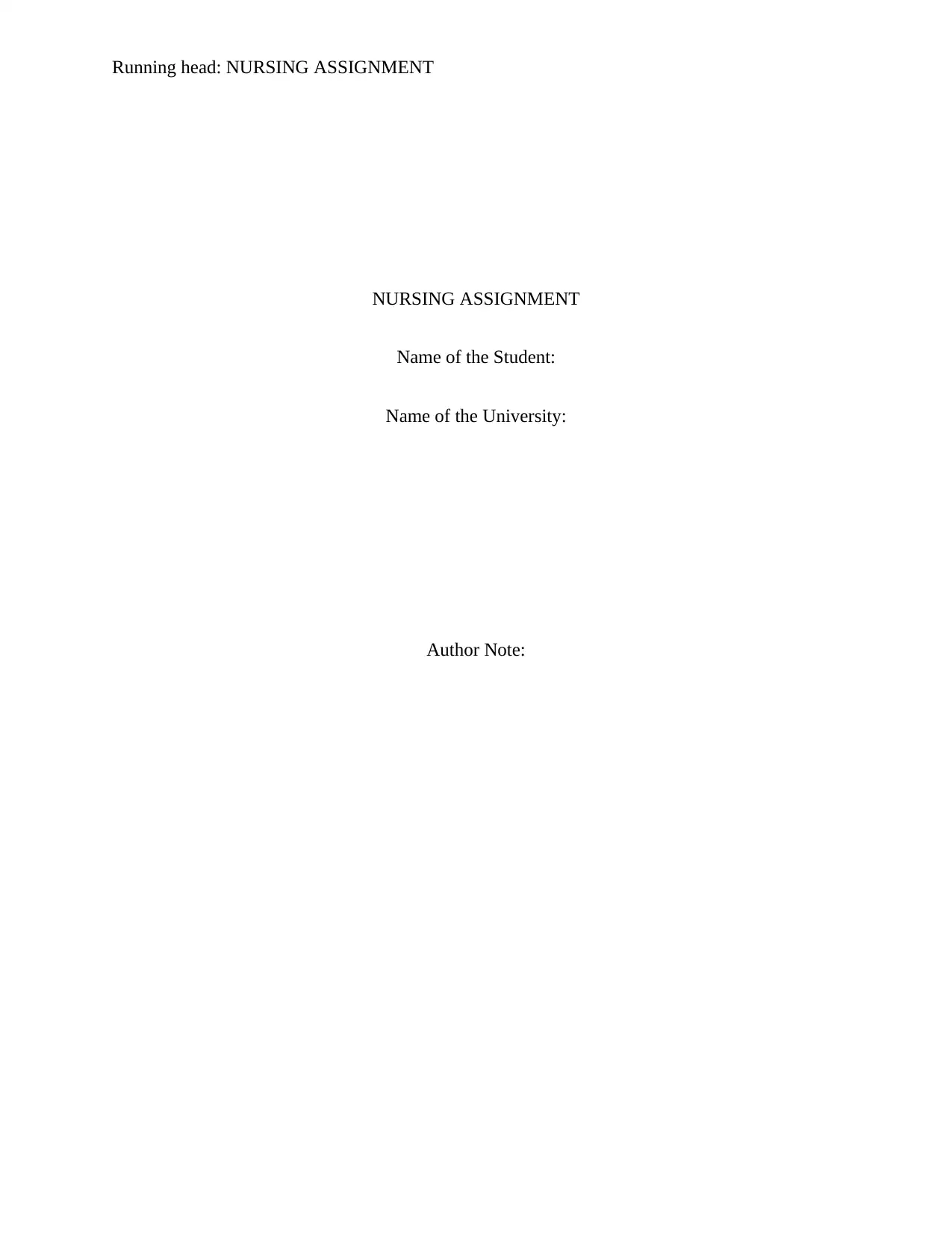
Running head: NURSING ASSIGNMENT
NURSING ASSIGNMENT
Name of the Student:
Name of the University:
Author Note:
NURSING ASSIGNMENT
Name of the Student:
Name of the University:
Author Note:
Paraphrase This Document
Need a fresh take? Get an instant paraphrase of this document with our AI Paraphraser
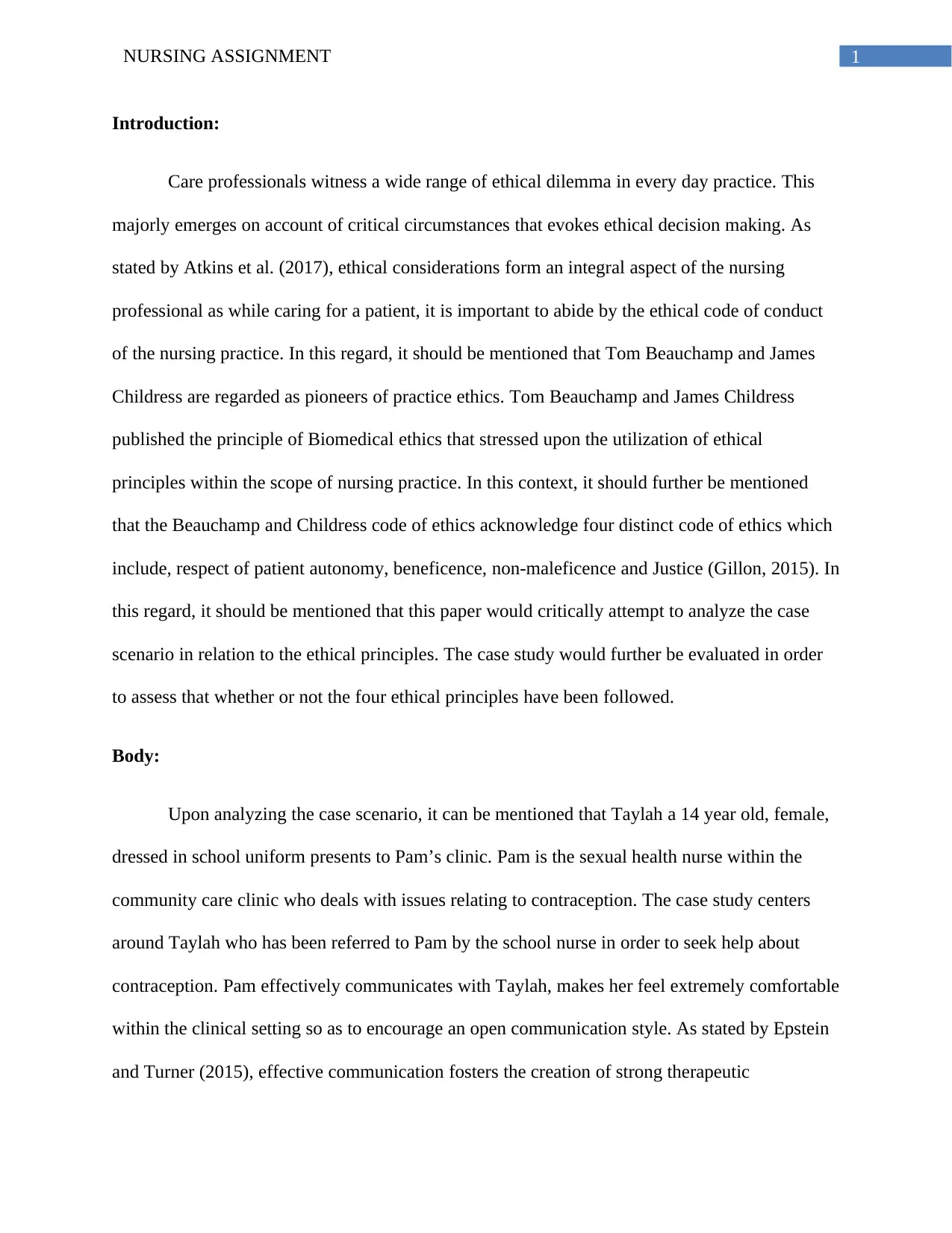
1NURSING ASSIGNMENT
Introduction:
Care professionals witness a wide range of ethical dilemma in every day practice. This
majorly emerges on account of critical circumstances that evokes ethical decision making. As
stated by Atkins et al. (2017), ethical considerations form an integral aspect of the nursing
professional as while caring for a patient, it is important to abide by the ethical code of conduct
of the nursing practice. In this regard, it should be mentioned that Tom Beauchamp and James
Childress are regarded as pioneers of practice ethics. Tom Beauchamp and James Childress
published the principle of Biomedical ethics that stressed upon the utilization of ethical
principles within the scope of nursing practice. In this context, it should further be mentioned
that the Beauchamp and Childress code of ethics acknowledge four distinct code of ethics which
include, respect of patient autonomy, beneficence, non-maleficence and Justice (Gillon, 2015). In
this regard, it should be mentioned that this paper would critically attempt to analyze the case
scenario in relation to the ethical principles. The case study would further be evaluated in order
to assess that whether or not the four ethical principles have been followed.
Body:
Upon analyzing the case scenario, it can be mentioned that Taylah a 14 year old, female,
dressed in school uniform presents to Pam’s clinic. Pam is the sexual health nurse within the
community care clinic who deals with issues relating to contraception. The case study centers
around Taylah who has been referred to Pam by the school nurse in order to seek help about
contraception. Pam effectively communicates with Taylah, makes her feel extremely comfortable
within the clinical setting so as to encourage an open communication style. As stated by Epstein
and Turner (2015), effective communication fosters the creation of strong therapeutic
Introduction:
Care professionals witness a wide range of ethical dilemma in every day practice. This
majorly emerges on account of critical circumstances that evokes ethical decision making. As
stated by Atkins et al. (2017), ethical considerations form an integral aspect of the nursing
professional as while caring for a patient, it is important to abide by the ethical code of conduct
of the nursing practice. In this regard, it should be mentioned that Tom Beauchamp and James
Childress are regarded as pioneers of practice ethics. Tom Beauchamp and James Childress
published the principle of Biomedical ethics that stressed upon the utilization of ethical
principles within the scope of nursing practice. In this context, it should further be mentioned
that the Beauchamp and Childress code of ethics acknowledge four distinct code of ethics which
include, respect of patient autonomy, beneficence, non-maleficence and Justice (Gillon, 2015). In
this regard, it should be mentioned that this paper would critically attempt to analyze the case
scenario in relation to the ethical principles. The case study would further be evaluated in order
to assess that whether or not the four ethical principles have been followed.
Body:
Upon analyzing the case scenario, it can be mentioned that Taylah a 14 year old, female,
dressed in school uniform presents to Pam’s clinic. Pam is the sexual health nurse within the
community care clinic who deals with issues relating to contraception. The case study centers
around Taylah who has been referred to Pam by the school nurse in order to seek help about
contraception. Pam effectively communicates with Taylah, makes her feel extremely comfortable
within the clinical setting so as to encourage an open communication style. As stated by Epstein
and Turner (2015), effective communication fosters the creation of strong therapeutic
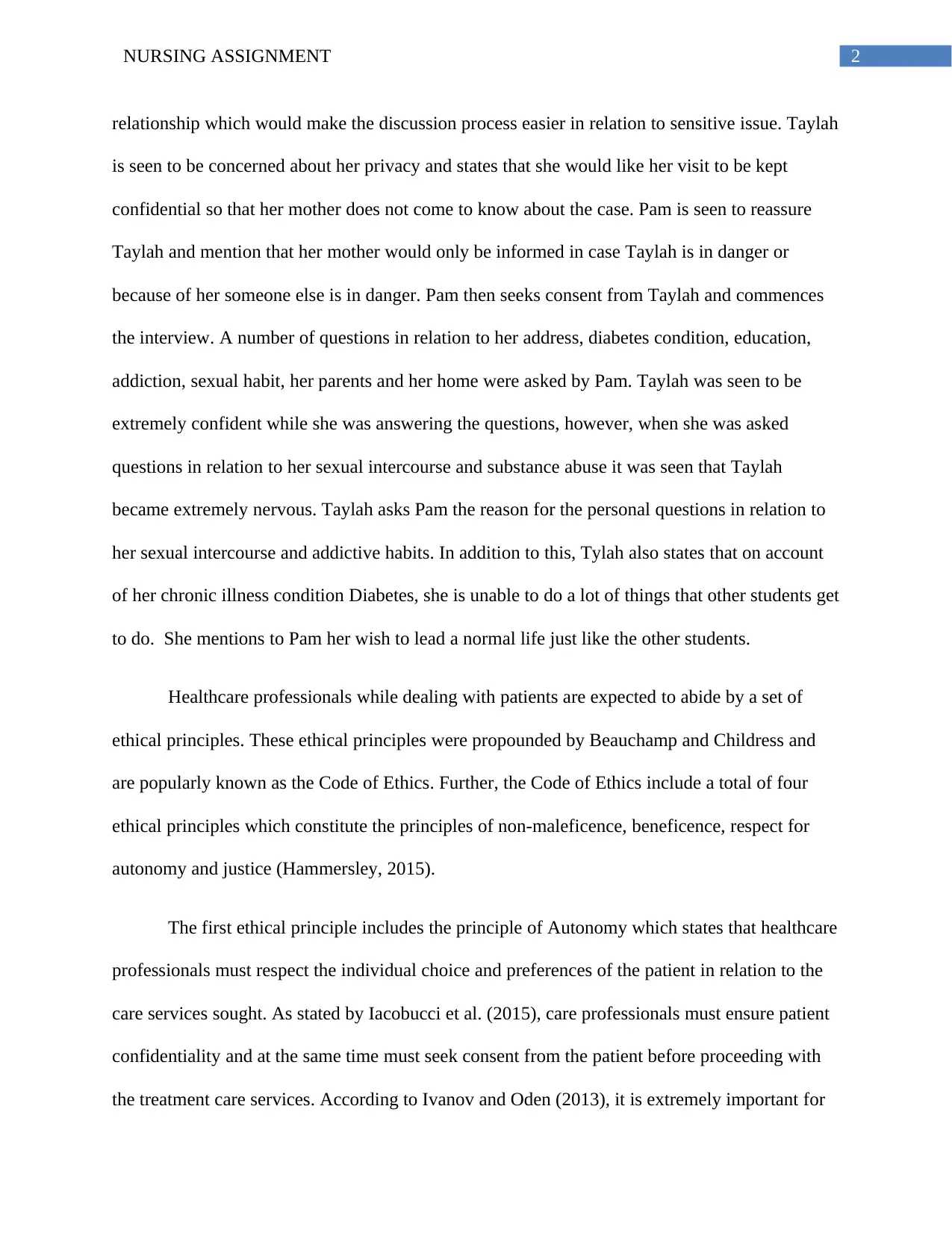
2NURSING ASSIGNMENT
relationship which would make the discussion process easier in relation to sensitive issue. Taylah
is seen to be concerned about her privacy and states that she would like her visit to be kept
confidential so that her mother does not come to know about the case. Pam is seen to reassure
Taylah and mention that her mother would only be informed in case Taylah is in danger or
because of her someone else is in danger. Pam then seeks consent from Taylah and commences
the interview. A number of questions in relation to her address, diabetes condition, education,
addiction, sexual habit, her parents and her home were asked by Pam. Taylah was seen to be
extremely confident while she was answering the questions, however, when she was asked
questions in relation to her sexual intercourse and substance abuse it was seen that Taylah
became extremely nervous. Taylah asks Pam the reason for the personal questions in relation to
her sexual intercourse and addictive habits. In addition to this, Tylah also states that on account
of her chronic illness condition Diabetes, she is unable to do a lot of things that other students get
to do. She mentions to Pam her wish to lead a normal life just like the other students.
Healthcare professionals while dealing with patients are expected to abide by a set of
ethical principles. These ethical principles were propounded by Beauchamp and Childress and
are popularly known as the Code of Ethics. Further, the Code of Ethics include a total of four
ethical principles which constitute the principles of non-maleficence, beneficence, respect for
autonomy and justice (Hammersley, 2015).
The first ethical principle includes the principle of Autonomy which states that healthcare
professionals must respect the individual choice and preferences of the patient in relation to the
care services sought. As stated by Iacobucci et al. (2015), care professionals must ensure patient
confidentiality and at the same time must seek consent from the patient before proceeding with
the treatment care services. According to Ivanov and Oden (2013), it is extremely important for
relationship which would make the discussion process easier in relation to sensitive issue. Taylah
is seen to be concerned about her privacy and states that she would like her visit to be kept
confidential so that her mother does not come to know about the case. Pam is seen to reassure
Taylah and mention that her mother would only be informed in case Taylah is in danger or
because of her someone else is in danger. Pam then seeks consent from Taylah and commences
the interview. A number of questions in relation to her address, diabetes condition, education,
addiction, sexual habit, her parents and her home were asked by Pam. Taylah was seen to be
extremely confident while she was answering the questions, however, when she was asked
questions in relation to her sexual intercourse and substance abuse it was seen that Taylah
became extremely nervous. Taylah asks Pam the reason for the personal questions in relation to
her sexual intercourse and addictive habits. In addition to this, Tylah also states that on account
of her chronic illness condition Diabetes, she is unable to do a lot of things that other students get
to do. She mentions to Pam her wish to lead a normal life just like the other students.
Healthcare professionals while dealing with patients are expected to abide by a set of
ethical principles. These ethical principles were propounded by Beauchamp and Childress and
are popularly known as the Code of Ethics. Further, the Code of Ethics include a total of four
ethical principles which constitute the principles of non-maleficence, beneficence, respect for
autonomy and justice (Hammersley, 2015).
The first ethical principle includes the principle of Autonomy which states that healthcare
professionals must respect the individual choice and preferences of the patient in relation to the
care services sought. As stated by Iacobucci et al. (2015), care professionals must ensure patient
confidentiality and at the same time must seek consent from the patient before proceeding with
the treatment care services. According to Ivanov and Oden (2013), it is extremely important for
⊘ This is a preview!⊘
Do you want full access?
Subscribe today to unlock all pages.

Trusted by 1+ million students worldwide
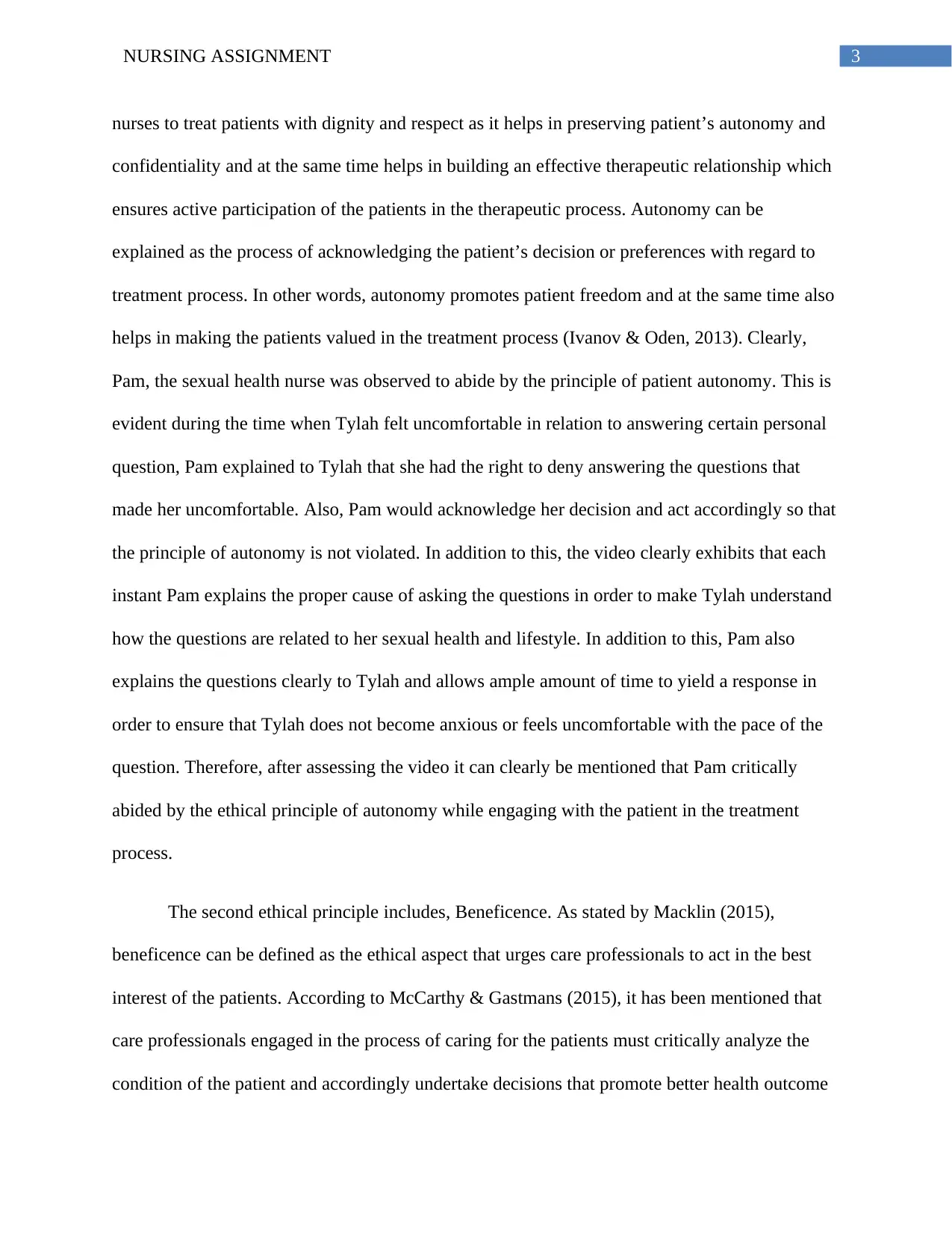
3NURSING ASSIGNMENT
nurses to treat patients with dignity and respect as it helps in preserving patient’s autonomy and
confidentiality and at the same time helps in building an effective therapeutic relationship which
ensures active participation of the patients in the therapeutic process. Autonomy can be
explained as the process of acknowledging the patient’s decision or preferences with regard to
treatment process. In other words, autonomy promotes patient freedom and at the same time also
helps in making the patients valued in the treatment process (Ivanov & Oden, 2013). Clearly,
Pam, the sexual health nurse was observed to abide by the principle of patient autonomy. This is
evident during the time when Tylah felt uncomfortable in relation to answering certain personal
question, Pam explained to Tylah that she had the right to deny answering the questions that
made her uncomfortable. Also, Pam would acknowledge her decision and act accordingly so that
the principle of autonomy is not violated. In addition to this, the video clearly exhibits that each
instant Pam explains the proper cause of asking the questions in order to make Tylah understand
how the questions are related to her sexual health and lifestyle. In addition to this, Pam also
explains the questions clearly to Tylah and allows ample amount of time to yield a response in
order to ensure that Tylah does not become anxious or feels uncomfortable with the pace of the
question. Therefore, after assessing the video it can clearly be mentioned that Pam critically
abided by the ethical principle of autonomy while engaging with the patient in the treatment
process.
The second ethical principle includes, Beneficence. As stated by Macklin (2015),
beneficence can be defined as the ethical aspect that urges care professionals to act in the best
interest of the patients. According to McCarthy & Gastmans (2015), it has been mentioned that
care professionals engaged in the process of caring for the patients must critically analyze the
condition of the patient and accordingly undertake decisions that promote better health outcome
nurses to treat patients with dignity and respect as it helps in preserving patient’s autonomy and
confidentiality and at the same time helps in building an effective therapeutic relationship which
ensures active participation of the patients in the therapeutic process. Autonomy can be
explained as the process of acknowledging the patient’s decision or preferences with regard to
treatment process. In other words, autonomy promotes patient freedom and at the same time also
helps in making the patients valued in the treatment process (Ivanov & Oden, 2013). Clearly,
Pam, the sexual health nurse was observed to abide by the principle of patient autonomy. This is
evident during the time when Tylah felt uncomfortable in relation to answering certain personal
question, Pam explained to Tylah that she had the right to deny answering the questions that
made her uncomfortable. Also, Pam would acknowledge her decision and act accordingly so that
the principle of autonomy is not violated. In addition to this, the video clearly exhibits that each
instant Pam explains the proper cause of asking the questions in order to make Tylah understand
how the questions are related to her sexual health and lifestyle. In addition to this, Pam also
explains the questions clearly to Tylah and allows ample amount of time to yield a response in
order to ensure that Tylah does not become anxious or feels uncomfortable with the pace of the
question. Therefore, after assessing the video it can clearly be mentioned that Pam critically
abided by the ethical principle of autonomy while engaging with the patient in the treatment
process.
The second ethical principle includes, Beneficence. As stated by Macklin (2015),
beneficence can be defined as the ethical aspect that urges care professionals to act in the best
interest of the patients. According to McCarthy & Gastmans (2015), it has been mentioned that
care professionals engaged in the process of caring for the patients must critically analyze the
condition of the patient and accordingly undertake decisions that promote better health outcome
Paraphrase This Document
Need a fresh take? Get an instant paraphrase of this document with our AI Paraphraser
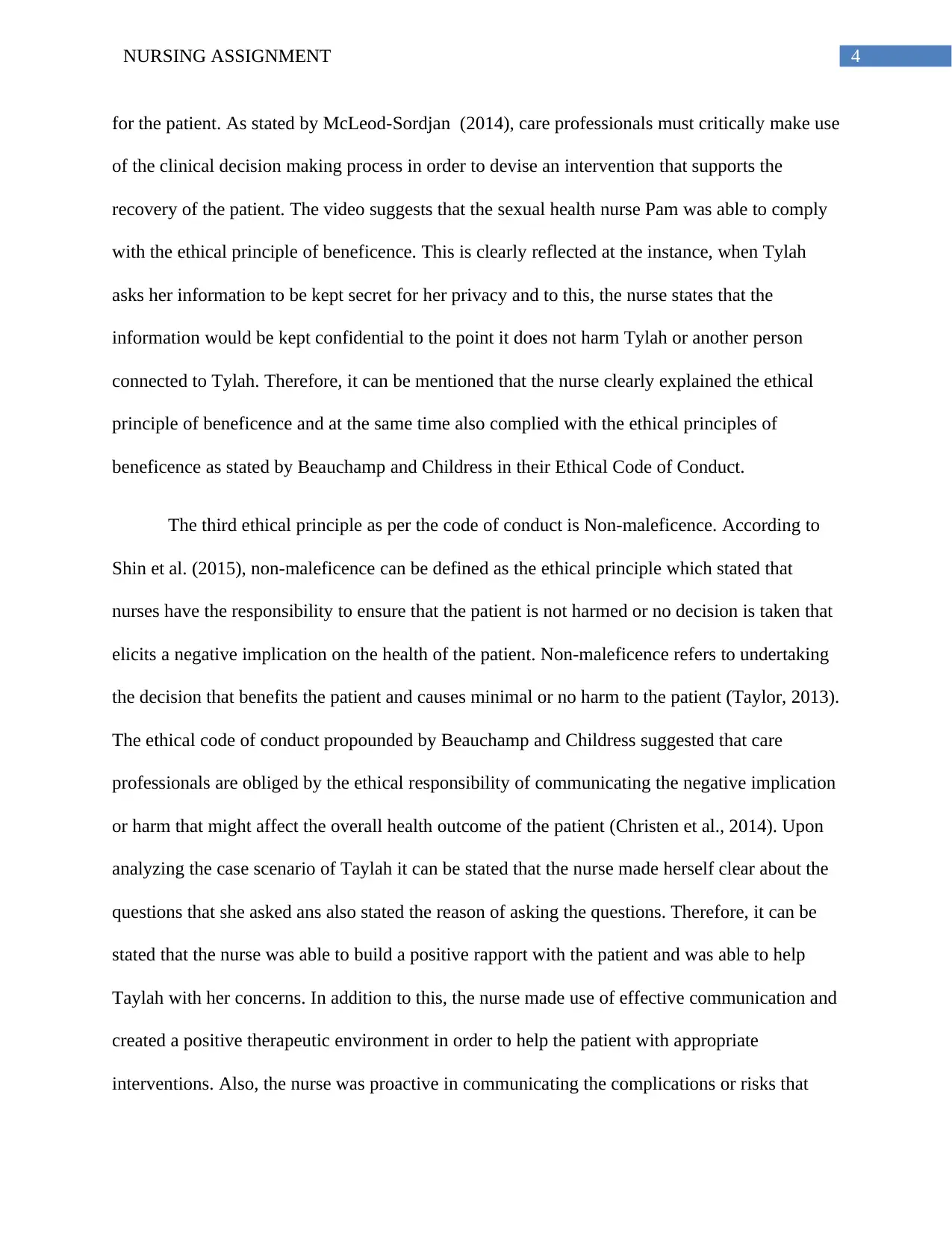
4NURSING ASSIGNMENT
for the patient. As stated by McLeod-Sordjan (2014), care professionals must critically make use
of the clinical decision making process in order to devise an intervention that supports the
recovery of the patient. The video suggests that the sexual health nurse Pam was able to comply
with the ethical principle of beneficence. This is clearly reflected at the instance, when Tylah
asks her information to be kept secret for her privacy and to this, the nurse states that the
information would be kept confidential to the point it does not harm Tylah or another person
connected to Tylah. Therefore, it can be mentioned that the nurse clearly explained the ethical
principle of beneficence and at the same time also complied with the ethical principles of
beneficence as stated by Beauchamp and Childress in their Ethical Code of Conduct.
The third ethical principle as per the code of conduct is Non-maleficence. According to
Shin et al. (2015), non-maleficence can be defined as the ethical principle which stated that
nurses have the responsibility to ensure that the patient is not harmed or no decision is taken that
elicits a negative implication on the health of the patient. Non-maleficence refers to undertaking
the decision that benefits the patient and causes minimal or no harm to the patient (Taylor, 2013).
The ethical code of conduct propounded by Beauchamp and Childress suggested that care
professionals are obliged by the ethical responsibility of communicating the negative implication
or harm that might affect the overall health outcome of the patient (Christen et al., 2014). Upon
analyzing the case scenario of Taylah it can be stated that the nurse made herself clear about the
questions that she asked ans also stated the reason of asking the questions. Therefore, it can be
stated that the nurse was able to build a positive rapport with the patient and was able to help
Taylah with her concerns. In addition to this, the nurse made use of effective communication and
created a positive therapeutic environment in order to help the patient with appropriate
interventions. Also, the nurse was proactive in communicating the complications or risks that
for the patient. As stated by McLeod-Sordjan (2014), care professionals must critically make use
of the clinical decision making process in order to devise an intervention that supports the
recovery of the patient. The video suggests that the sexual health nurse Pam was able to comply
with the ethical principle of beneficence. This is clearly reflected at the instance, when Tylah
asks her information to be kept secret for her privacy and to this, the nurse states that the
information would be kept confidential to the point it does not harm Tylah or another person
connected to Tylah. Therefore, it can be mentioned that the nurse clearly explained the ethical
principle of beneficence and at the same time also complied with the ethical principles of
beneficence as stated by Beauchamp and Childress in their Ethical Code of Conduct.
The third ethical principle as per the code of conduct is Non-maleficence. According to
Shin et al. (2015), non-maleficence can be defined as the ethical principle which stated that
nurses have the responsibility to ensure that the patient is not harmed or no decision is taken that
elicits a negative implication on the health of the patient. Non-maleficence refers to undertaking
the decision that benefits the patient and causes minimal or no harm to the patient (Taylor, 2013).
The ethical code of conduct propounded by Beauchamp and Childress suggested that care
professionals are obliged by the ethical responsibility of communicating the negative implication
or harm that might affect the overall health outcome of the patient (Christen et al., 2014). Upon
analyzing the case scenario of Taylah it can be stated that the nurse made herself clear about the
questions that she asked ans also stated the reason of asking the questions. Therefore, it can be
stated that the nurse was able to build a positive rapport with the patient and was able to help
Taylah with her concerns. In addition to this, the nurse made use of effective communication and
created a positive therapeutic environment in order to help the patient with appropriate
interventions. Also, the nurse was proactive in communicating the complications or risks that
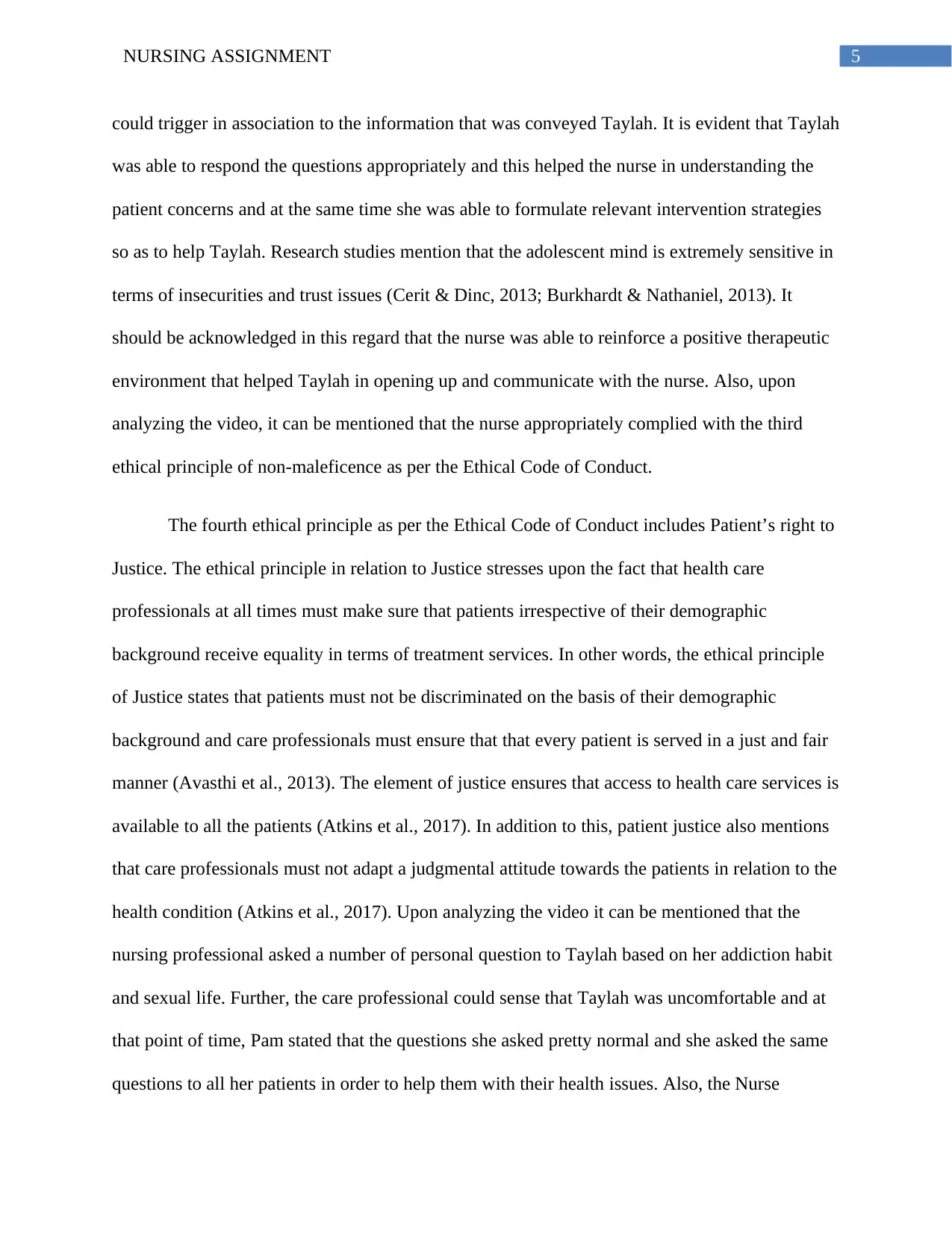
5NURSING ASSIGNMENT
could trigger in association to the information that was conveyed Taylah. It is evident that Taylah
was able to respond the questions appropriately and this helped the nurse in understanding the
patient concerns and at the same time she was able to formulate relevant intervention strategies
so as to help Taylah. Research studies mention that the adolescent mind is extremely sensitive in
terms of insecurities and trust issues (Cerit & Dinc, 2013; Burkhardt & Nathaniel, 2013). It
should be acknowledged in this regard that the nurse was able to reinforce a positive therapeutic
environment that helped Taylah in opening up and communicate with the nurse. Also, upon
analyzing the video, it can be mentioned that the nurse appropriately complied with the third
ethical principle of non-maleficence as per the Ethical Code of Conduct.
The fourth ethical principle as per the Ethical Code of Conduct includes Patient’s right to
Justice. The ethical principle in relation to Justice stresses upon the fact that health care
professionals at all times must make sure that patients irrespective of their demographic
background receive equality in terms of treatment services. In other words, the ethical principle
of Justice states that patients must not be discriminated on the basis of their demographic
background and care professionals must ensure that that every patient is served in a just and fair
manner (Avasthi et al., 2013). The element of justice ensures that access to health care services is
available to all the patients (Atkins et al., 2017). In addition to this, patient justice also mentions
that care professionals must not adapt a judgmental attitude towards the patients in relation to the
health condition (Atkins et al., 2017). Upon analyzing the video it can be mentioned that the
nursing professional asked a number of personal question to Taylah based on her addiction habit
and sexual life. Further, the care professional could sense that Taylah was uncomfortable and at
that point of time, Pam stated that the questions she asked pretty normal and she asked the same
questions to all her patients in order to help them with their health issues. Also, the Nurse
could trigger in association to the information that was conveyed Taylah. It is evident that Taylah
was able to respond the questions appropriately and this helped the nurse in understanding the
patient concerns and at the same time she was able to formulate relevant intervention strategies
so as to help Taylah. Research studies mention that the adolescent mind is extremely sensitive in
terms of insecurities and trust issues (Cerit & Dinc, 2013; Burkhardt & Nathaniel, 2013). It
should be acknowledged in this regard that the nurse was able to reinforce a positive therapeutic
environment that helped Taylah in opening up and communicate with the nurse. Also, upon
analyzing the video, it can be mentioned that the nurse appropriately complied with the third
ethical principle of non-maleficence as per the Ethical Code of Conduct.
The fourth ethical principle as per the Ethical Code of Conduct includes Patient’s right to
Justice. The ethical principle in relation to Justice stresses upon the fact that health care
professionals at all times must make sure that patients irrespective of their demographic
background receive equality in terms of treatment services. In other words, the ethical principle
of Justice states that patients must not be discriminated on the basis of their demographic
background and care professionals must ensure that that every patient is served in a just and fair
manner (Avasthi et al., 2013). The element of justice ensures that access to health care services is
available to all the patients (Atkins et al., 2017). In addition to this, patient justice also mentions
that care professionals must not adapt a judgmental attitude towards the patients in relation to the
health condition (Atkins et al., 2017). Upon analyzing the video it can be mentioned that the
nursing professional asked a number of personal question to Taylah based on her addiction habit
and sexual life. Further, the care professional could sense that Taylah was uncomfortable and at
that point of time, Pam stated that the questions she asked pretty normal and she asked the same
questions to all her patients in order to help them with their health issues. Also, the Nurse
⊘ This is a preview!⊘
Do you want full access?
Subscribe today to unlock all pages.

Trusted by 1+ million students worldwide
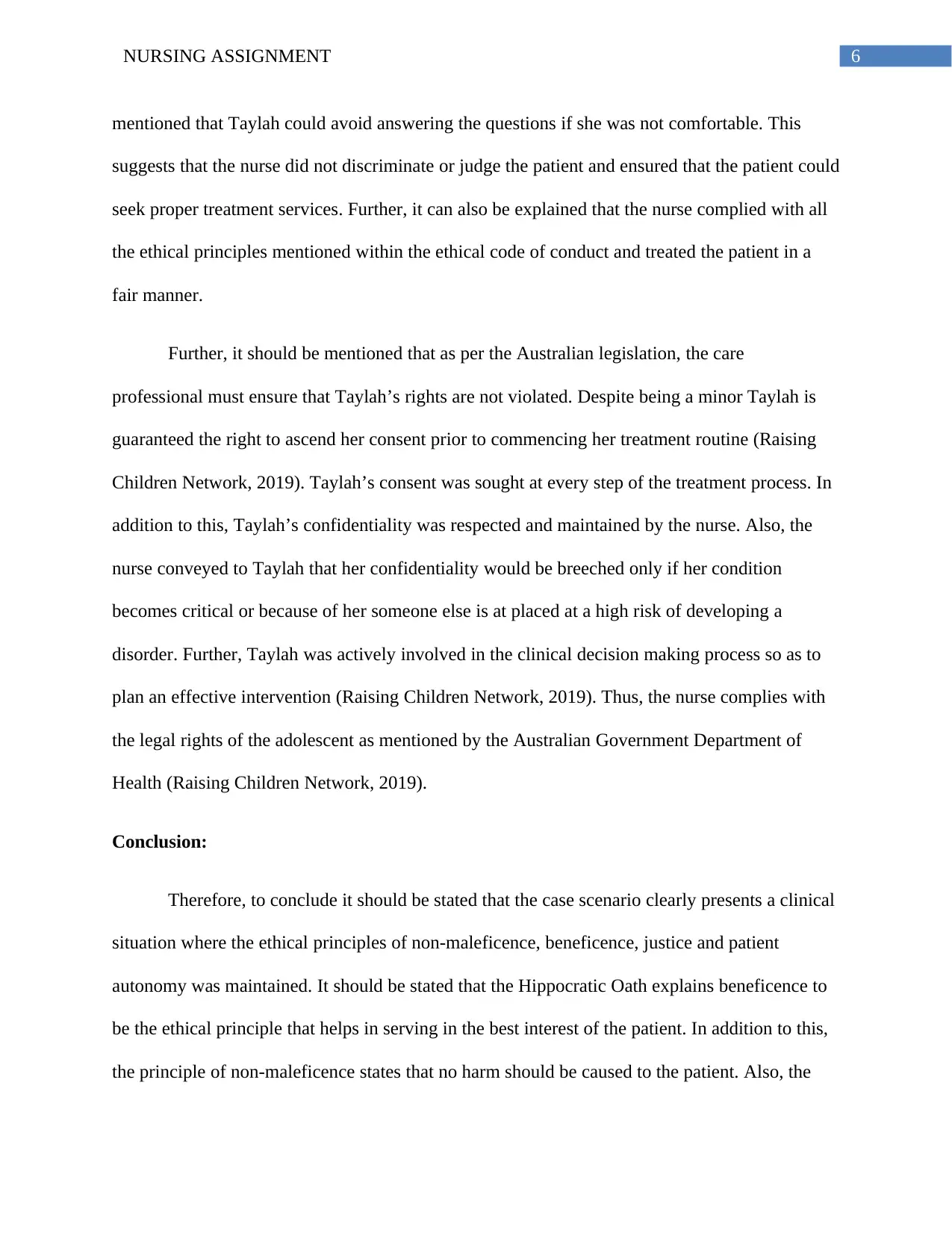
6NURSING ASSIGNMENT
mentioned that Taylah could avoid answering the questions if she was not comfortable. This
suggests that the nurse did not discriminate or judge the patient and ensured that the patient could
seek proper treatment services. Further, it can also be explained that the nurse complied with all
the ethical principles mentioned within the ethical code of conduct and treated the patient in a
fair manner.
Further, it should be mentioned that as per the Australian legislation, the care
professional must ensure that Taylah’s rights are not violated. Despite being a minor Taylah is
guaranteed the right to ascend her consent prior to commencing her treatment routine (Raising
Children Network, 2019). Taylah’s consent was sought at every step of the treatment process. In
addition to this, Taylah’s confidentiality was respected and maintained by the nurse. Also, the
nurse conveyed to Taylah that her confidentiality would be breeched only if her condition
becomes critical or because of her someone else is at placed at a high risk of developing a
disorder. Further, Taylah was actively involved in the clinical decision making process so as to
plan an effective intervention (Raising Children Network, 2019). Thus, the nurse complies with
the legal rights of the adolescent as mentioned by the Australian Government Department of
Health (Raising Children Network, 2019).
Conclusion:
Therefore, to conclude it should be stated that the case scenario clearly presents a clinical
situation where the ethical principles of non-maleficence, beneficence, justice and patient
autonomy was maintained. It should be stated that the Hippocratic Oath explains beneficence to
be the ethical principle that helps in serving in the best interest of the patient. In addition to this,
the principle of non-maleficence states that no harm should be caused to the patient. Also, the
mentioned that Taylah could avoid answering the questions if she was not comfortable. This
suggests that the nurse did not discriminate or judge the patient and ensured that the patient could
seek proper treatment services. Further, it can also be explained that the nurse complied with all
the ethical principles mentioned within the ethical code of conduct and treated the patient in a
fair manner.
Further, it should be mentioned that as per the Australian legislation, the care
professional must ensure that Taylah’s rights are not violated. Despite being a minor Taylah is
guaranteed the right to ascend her consent prior to commencing her treatment routine (Raising
Children Network, 2019). Taylah’s consent was sought at every step of the treatment process. In
addition to this, Taylah’s confidentiality was respected and maintained by the nurse. Also, the
nurse conveyed to Taylah that her confidentiality would be breeched only if her condition
becomes critical or because of her someone else is at placed at a high risk of developing a
disorder. Further, Taylah was actively involved in the clinical decision making process so as to
plan an effective intervention (Raising Children Network, 2019). Thus, the nurse complies with
the legal rights of the adolescent as mentioned by the Australian Government Department of
Health (Raising Children Network, 2019).
Conclusion:
Therefore, to conclude it should be stated that the case scenario clearly presents a clinical
situation where the ethical principles of non-maleficence, beneficence, justice and patient
autonomy was maintained. It should be stated that the Hippocratic Oath explains beneficence to
be the ethical principle that helps in serving in the best interest of the patient. In addition to this,
the principle of non-maleficence states that no harm should be caused to the patient. Also, the
Paraphrase This Document
Need a fresh take? Get an instant paraphrase of this document with our AI Paraphraser
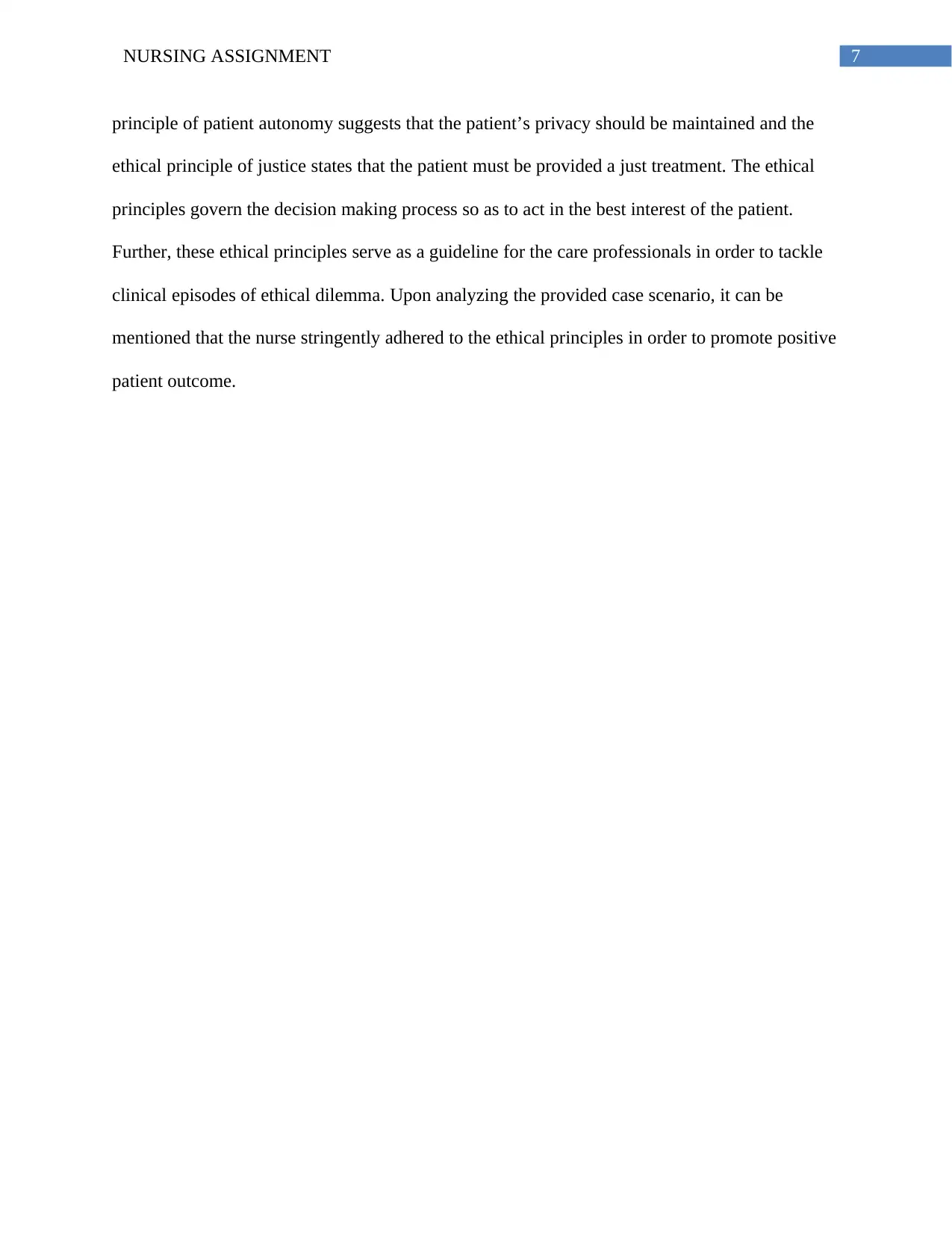
7NURSING ASSIGNMENT
principle of patient autonomy suggests that the patient’s privacy should be maintained and the
ethical principle of justice states that the patient must be provided a just treatment. The ethical
principles govern the decision making process so as to act in the best interest of the patient.
Further, these ethical principles serve as a guideline for the care professionals in order to tackle
clinical episodes of ethical dilemma. Upon analyzing the provided case scenario, it can be
mentioned that the nurse stringently adhered to the ethical principles in order to promote positive
patient outcome.
principle of patient autonomy suggests that the patient’s privacy should be maintained and the
ethical principle of justice states that the patient must be provided a just treatment. The ethical
principles govern the decision making process so as to act in the best interest of the patient.
Further, these ethical principles serve as a guideline for the care professionals in order to tackle
clinical episodes of ethical dilemma. Upon analyzing the provided case scenario, it can be
mentioned that the nurse stringently adhered to the ethical principles in order to promote positive
patient outcome.
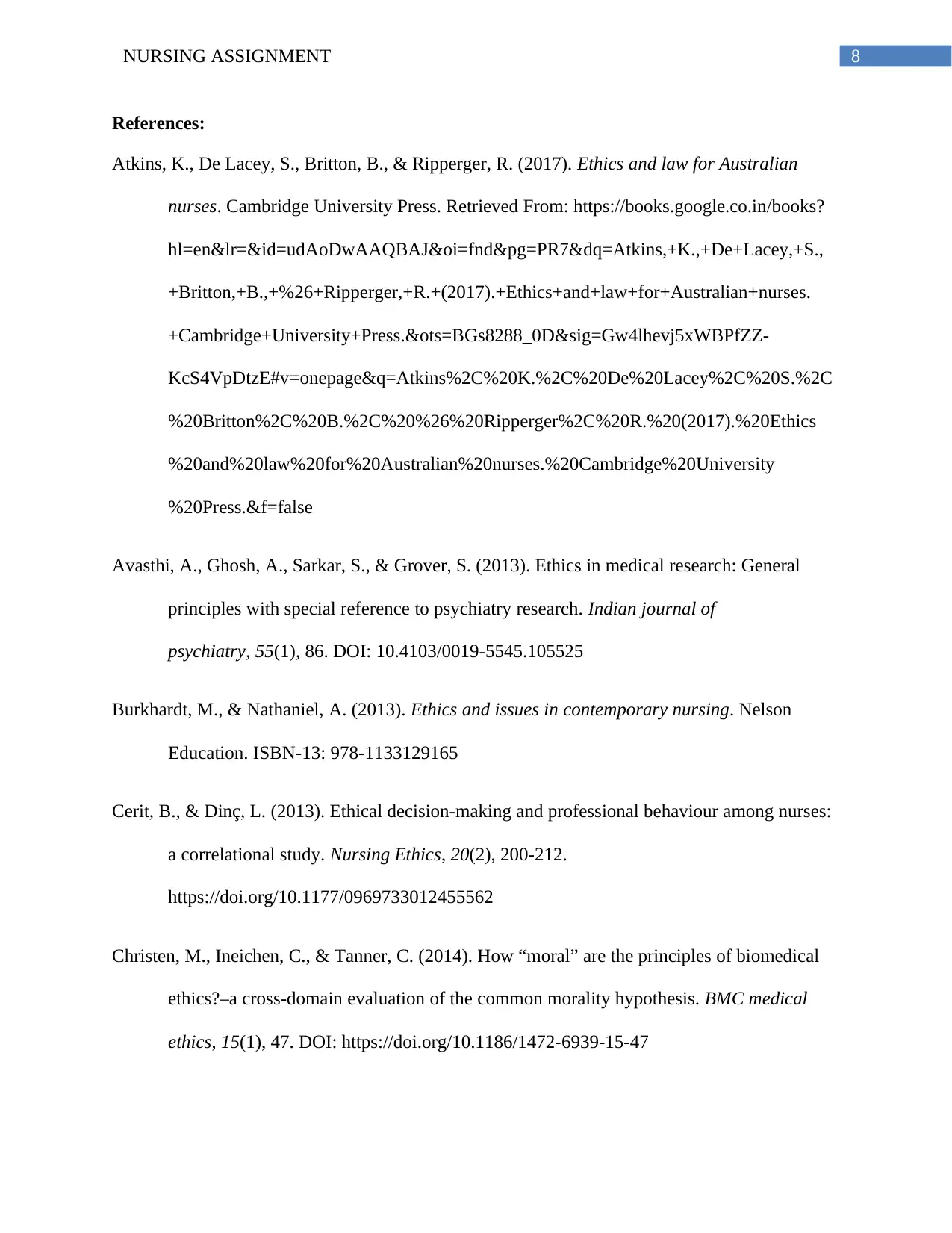
8NURSING ASSIGNMENT
References:
Atkins, K., De Lacey, S., Britton, B., & Ripperger, R. (2017). Ethics and law for Australian
nurses. Cambridge University Press. Retrieved From: https://books.google.co.in/books?
hl=en&lr=&id=udAoDwAAQBAJ&oi=fnd&pg=PR7&dq=Atkins,+K.,+De+Lacey,+S.,
+Britton,+B.,+%26+Ripperger,+R.+(2017).+Ethics+and+law+for+Australian+nurses.
+Cambridge+University+Press.&ots=BGs8288_0D&sig=Gw4lhevj5xWBPfZZ-
KcS4VpDtzE#v=onepage&q=Atkins%2C%20K.%2C%20De%20Lacey%2C%20S.%2C
%20Britton%2C%20B.%2C%20%26%20Ripperger%2C%20R.%20(2017).%20Ethics
%20and%20law%20for%20Australian%20nurses.%20Cambridge%20University
%20Press.&f=false
Avasthi, A., Ghosh, A., Sarkar, S., & Grover, S. (2013). Ethics in medical research: General
principles with special reference to psychiatry research. Indian journal of
psychiatry, 55(1), 86. DOI: 10.4103/0019-5545.105525
Burkhardt, M., & Nathaniel, A. (2013). Ethics and issues in contemporary nursing. Nelson
Education. ISBN-13: 978-1133129165
Cerit, B., & Dinç, L. (2013). Ethical decision-making and professional behaviour among nurses:
a correlational study. Nursing Ethics, 20(2), 200-212.
https://doi.org/10.1177/0969733012455562
Christen, M., Ineichen, C., & Tanner, C. (2014). How “moral” are the principles of biomedical
ethics?–a cross-domain evaluation of the common morality hypothesis. BMC medical
ethics, 15(1), 47. DOI: https://doi.org/10.1186/1472-6939-15-47
References:
Atkins, K., De Lacey, S., Britton, B., & Ripperger, R. (2017). Ethics and law for Australian
nurses. Cambridge University Press. Retrieved From: https://books.google.co.in/books?
hl=en&lr=&id=udAoDwAAQBAJ&oi=fnd&pg=PR7&dq=Atkins,+K.,+De+Lacey,+S.,
+Britton,+B.,+%26+Ripperger,+R.+(2017).+Ethics+and+law+for+Australian+nurses.
+Cambridge+University+Press.&ots=BGs8288_0D&sig=Gw4lhevj5xWBPfZZ-
KcS4VpDtzE#v=onepage&q=Atkins%2C%20K.%2C%20De%20Lacey%2C%20S.%2C
%20Britton%2C%20B.%2C%20%26%20Ripperger%2C%20R.%20(2017).%20Ethics
%20and%20law%20for%20Australian%20nurses.%20Cambridge%20University
%20Press.&f=false
Avasthi, A., Ghosh, A., Sarkar, S., & Grover, S. (2013). Ethics in medical research: General
principles with special reference to psychiatry research. Indian journal of
psychiatry, 55(1), 86. DOI: 10.4103/0019-5545.105525
Burkhardt, M., & Nathaniel, A. (2013). Ethics and issues in contemporary nursing. Nelson
Education. ISBN-13: 978-1133129165
Cerit, B., & Dinç, L. (2013). Ethical decision-making and professional behaviour among nurses:
a correlational study. Nursing Ethics, 20(2), 200-212.
https://doi.org/10.1177/0969733012455562
Christen, M., Ineichen, C., & Tanner, C. (2014). How “moral” are the principles of biomedical
ethics?–a cross-domain evaluation of the common morality hypothesis. BMC medical
ethics, 15(1), 47. DOI: https://doi.org/10.1186/1472-6939-15-47
⊘ This is a preview!⊘
Do you want full access?
Subscribe today to unlock all pages.

Trusted by 1+ million students worldwide
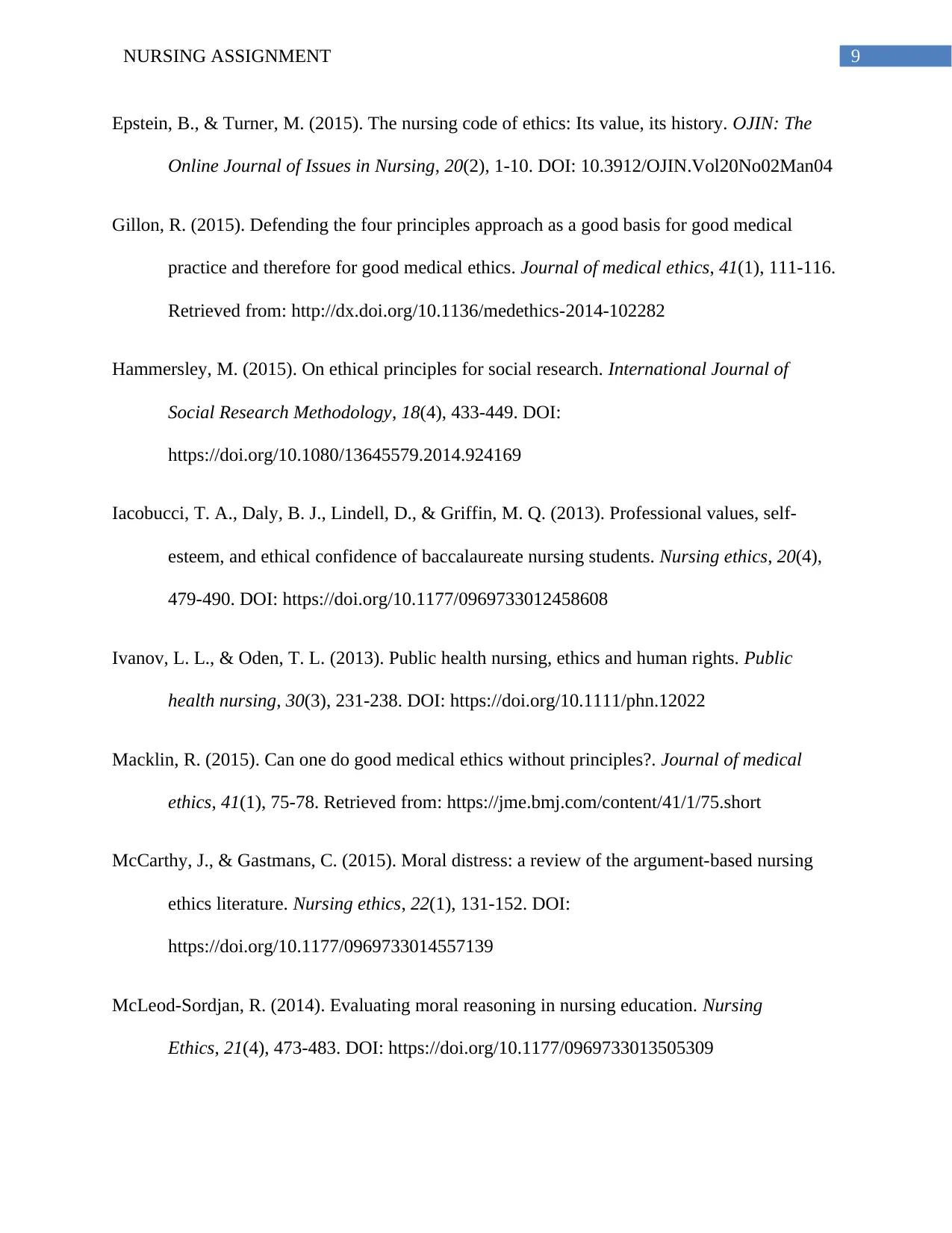
9NURSING ASSIGNMENT
Epstein, B., & Turner, M. (2015). The nursing code of ethics: Its value, its history. OJIN: The
Online Journal of Issues in Nursing, 20(2), 1-10. DOI: 10.3912/OJIN.Vol20No02Man04
Gillon, R. (2015). Defending the four principles approach as a good basis for good medical
practice and therefore for good medical ethics. Journal of medical ethics, 41(1), 111-116.
Retrieved from: http://dx.doi.org/10.1136/medethics-2014-102282
Hammersley, M. (2015). On ethical principles for social research. International Journal of
Social Research Methodology, 18(4), 433-449. DOI:
https://doi.org/10.1080/13645579.2014.924169
Iacobucci, T. A., Daly, B. J., Lindell, D., & Griffin, M. Q. (2013). Professional values, self-
esteem, and ethical confidence of baccalaureate nursing students. Nursing ethics, 20(4),
479-490. DOI: https://doi.org/10.1177/0969733012458608
Ivanov, L. L., & Oden, T. L. (2013). Public health nursing, ethics and human rights. Public
health nursing, 30(3), 231-238. DOI: https://doi.org/10.1111/phn.12022
Macklin, R. (2015). Can one do good medical ethics without principles?. Journal of medical
ethics, 41(1), 75-78. Retrieved from: https://jme.bmj.com/content/41/1/75.short
McCarthy, J., & Gastmans, C. (2015). Moral distress: a review of the argument-based nursing
ethics literature. Nursing ethics, 22(1), 131-152. DOI:
https://doi.org/10.1177/0969733014557139
McLeod-Sordjan, R. (2014). Evaluating moral reasoning in nursing education. Nursing
Ethics, 21(4), 473-483. DOI: https://doi.org/10.1177/0969733013505309
Epstein, B., & Turner, M. (2015). The nursing code of ethics: Its value, its history. OJIN: The
Online Journal of Issues in Nursing, 20(2), 1-10. DOI: 10.3912/OJIN.Vol20No02Man04
Gillon, R. (2015). Defending the four principles approach as a good basis for good medical
practice and therefore for good medical ethics. Journal of medical ethics, 41(1), 111-116.
Retrieved from: http://dx.doi.org/10.1136/medethics-2014-102282
Hammersley, M. (2015). On ethical principles for social research. International Journal of
Social Research Methodology, 18(4), 433-449. DOI:
https://doi.org/10.1080/13645579.2014.924169
Iacobucci, T. A., Daly, B. J., Lindell, D., & Griffin, M. Q. (2013). Professional values, self-
esteem, and ethical confidence of baccalaureate nursing students. Nursing ethics, 20(4),
479-490. DOI: https://doi.org/10.1177/0969733012458608
Ivanov, L. L., & Oden, T. L. (2013). Public health nursing, ethics and human rights. Public
health nursing, 30(3), 231-238. DOI: https://doi.org/10.1111/phn.12022
Macklin, R. (2015). Can one do good medical ethics without principles?. Journal of medical
ethics, 41(1), 75-78. Retrieved from: https://jme.bmj.com/content/41/1/75.short
McCarthy, J., & Gastmans, C. (2015). Moral distress: a review of the argument-based nursing
ethics literature. Nursing ethics, 22(1), 131-152. DOI:
https://doi.org/10.1177/0969733014557139
McLeod-Sordjan, R. (2014). Evaluating moral reasoning in nursing education. Nursing
Ethics, 21(4), 473-483. DOI: https://doi.org/10.1177/0969733013505309
Paraphrase This Document
Need a fresh take? Get an instant paraphrase of this document with our AI Paraphraser
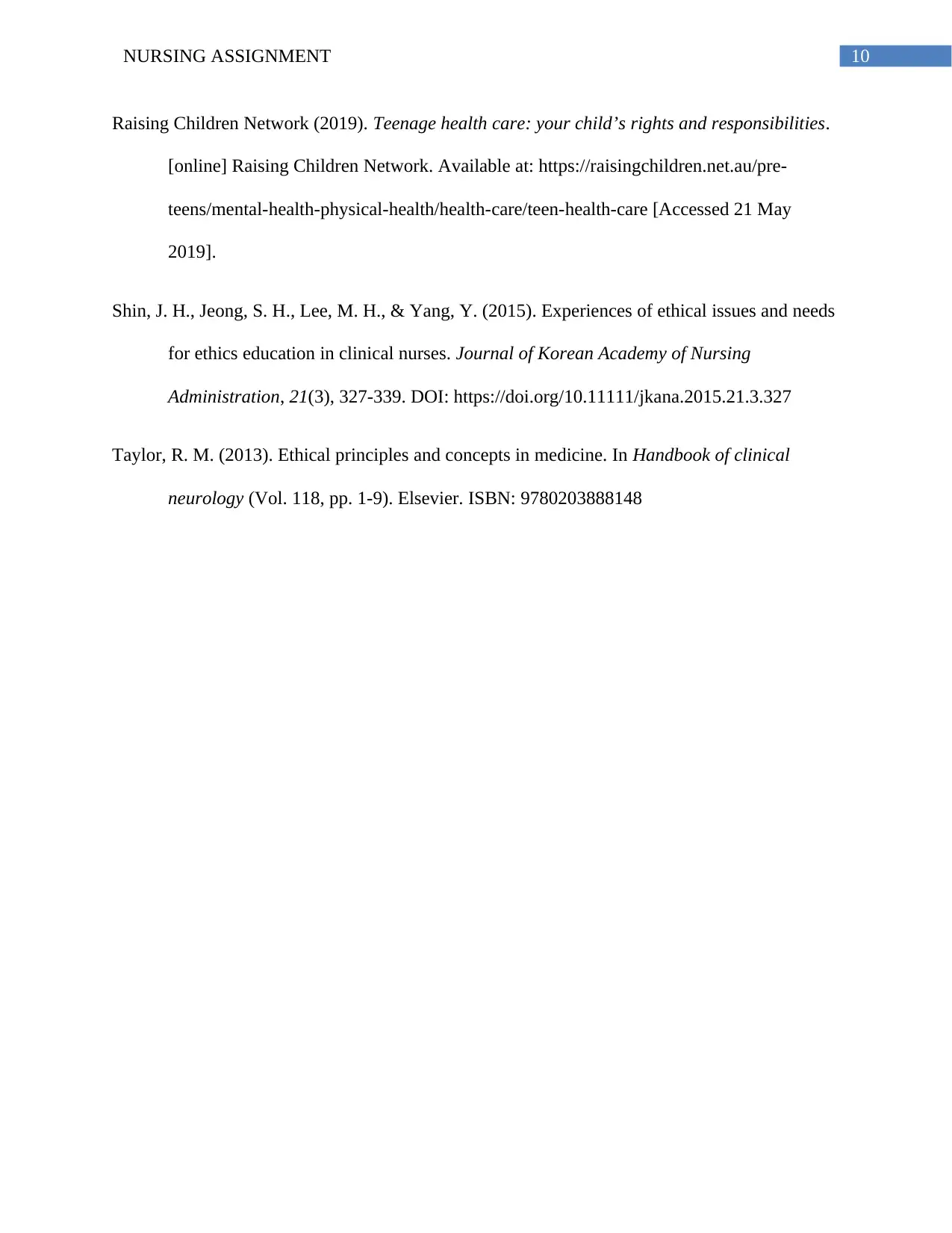
10NURSING ASSIGNMENT
Raising Children Network (2019). Teenage health care: your child’s rights and responsibilities.
[online] Raising Children Network. Available at: https://raisingchildren.net.au/pre-
teens/mental-health-physical-health/health-care/teen-health-care [Accessed 21 May
2019].
Shin, J. H., Jeong, S. H., Lee, M. H., & Yang, Y. (2015). Experiences of ethical issues and needs
for ethics education in clinical nurses. Journal of Korean Academy of Nursing
Administration, 21(3), 327-339. DOI: https://doi.org/10.11111/jkana.2015.21.3.327
Taylor, R. M. (2013). Ethical principles and concepts in medicine. In Handbook of clinical
neurology (Vol. 118, pp. 1-9). Elsevier. ISBN: 9780203888148
Raising Children Network (2019). Teenage health care: your child’s rights and responsibilities.
[online] Raising Children Network. Available at: https://raisingchildren.net.au/pre-
teens/mental-health-physical-health/health-care/teen-health-care [Accessed 21 May
2019].
Shin, J. H., Jeong, S. H., Lee, M. H., & Yang, Y. (2015). Experiences of ethical issues and needs
for ethics education in clinical nurses. Journal of Korean Academy of Nursing
Administration, 21(3), 327-339. DOI: https://doi.org/10.11111/jkana.2015.21.3.327
Taylor, R. M. (2013). Ethical principles and concepts in medicine. In Handbook of clinical
neurology (Vol. 118, pp. 1-9). Elsevier. ISBN: 9780203888148
1 out of 11
Related Documents
Your All-in-One AI-Powered Toolkit for Academic Success.
+13062052269
info@desklib.com
Available 24*7 on WhatsApp / Email
![[object Object]](/_next/static/media/star-bottom.7253800d.svg)
Unlock your academic potential
Copyright © 2020–2026 A2Z Services. All Rights Reserved. Developed and managed by ZUCOL.





